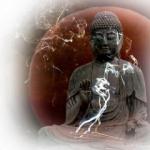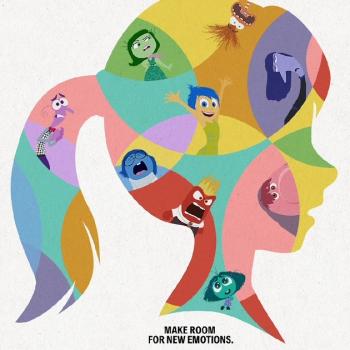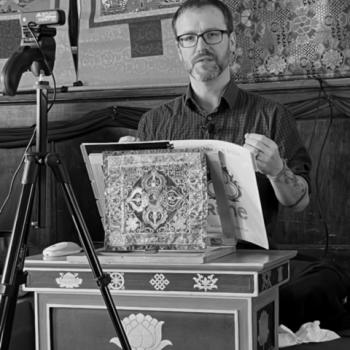“Now that I have this great ship, a precious human life, so hard to obtain, I must carry myself and others across the ocean of samsara. To that end, listen, reflect, and meditate day and night without distraction, is the practice of a bodhisattva.” – Thogme Sangpo, 37 Verses on the Practice of a Bodhisattva.
Do you think your life is meaningful?
If not, what would it take to make it so?
At the Rime Buddhist Center we’re about to do an intensive we do every year called “The 108 Day Bodhisattva Challenge“. This is an opportunity to take a deep dive into some mind training teachings and this will be my third year as one of the facilitators. This intensive is both in person and online, so you don’t have to live here in Kansas City to attend. We’re exploring a teaching called the 37 Verses on the Practice of a Bodhisattva.
It’s a teaching with, you guessed it, 37 verses. I wanted to just write about the first one here so you can know what we’re talking about. This is about using the teachings of wisdom and compassion in order to transform and empower ourselves. I believe you can transform your lives with these teachings and this is my favorite thing we do at the Rime Center, probably the most unique thing we do too. I haven’t heard of anyone else doing anything like it, anyway.
In his “Letter to a Friend,” Nagarjuna says,
“Since it is extremely difficult to obtain a human birth, by practicing the holy Dharma, lord of humans, make it meaningful.”
That ‘lord of humans’ bit is because the friend he wrote that letter to happened to be a king. Nagarjuna isn’t referring to me when he says ‘lord of humans’ and he isn’t referring to you either.
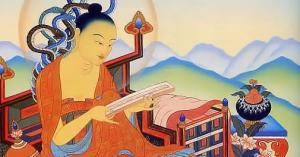
In “Way of the Bodhisattva,” Shantideva says,
“Cross the sea of emotions on the boat of human existence.”
That’s a pretty good metaphor, I think. Shantideva described life as like crossing an ocean and that’s how it’s described in the 37 Practices of a Bodhisattva too. I wrote it at the top and I’ll write it again here.
Now that I have this great ship, precious human life, so hard to obtain, I must carry myself and others across the ocean of samsara. To that end, to listen, reflect, and meditate day and night without distraction, is the practice of a bodhisattva.
I like that metaphor because we can add to it things like having a good map and sense of direction.
So life is like a ship and suffering is like an ocean that we’re trying to cross. Sometimes the ocean is relatively calm and other times it has deadly waves and tides. So, we need to appreciate this ship and also take good care of it. The waves are our attachments and emotions. We need to learn to navigate them or we’re in big trouble. The shore we’re trying to get to is Enlightenment.
And we’re calling this ship of our lives precious and hard to obtain. We have a tremendous ability to grow and change because we are human beings. We have potential.
We are lucky to be here.
We forget that. We forget because life is hard. Or we forget because life seems so ordinary.
I’m not here to make the case that life isn’t hard (that would be silly) but what if life isn’t ordinary? I think it isn’t. I think we’re closed off to the wonder of life but it’s still there.
Human life is rare and precious and we shouldn’t forget that. Most living things don’t have the potential that we do. We were born as human beings. We have a great opportunity, right now, to walk the path of the Bodhisattvas and attain enlightenment. Traditional Buddhist teachings say that it’s as unlikely to be born as a human being as it is for a turtle in the ocean to come hit a specific rope from underneath. That metaphor is sort of lost on me. But you could have been born as a chicken instead of a person. You weren’t. You’re part of the human race with the rest of us instead.
Many things make human life precious. We were born in a time and place where Buddhism is accessible (other religions too if you’re into those). We have all our faculties. We have some faith in spiritual teachings. We have the ability to find a teacher (even if we haven’t found one, the fact that we’re even able to look means something.) That’s mostly an old, traditional, list. I’d like to add that I really appreciate that I was born in a time and place that has running water, cats, and the internet. A whole lot of human history didn’t include those things (even cats!).
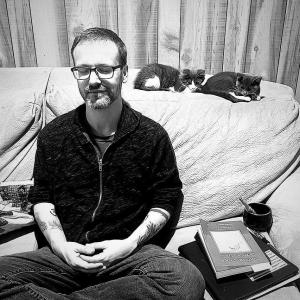
So, let’s try to reflect on human life being precious. Can that motivate and inspire us?
Also, let’s try not to waste our lives. If life is precious and rare, then maybe we shouldn’t be spending so much of our time chasing after things that don’t bring any lasting happiness. We’re lucky to be here and we just as easily could have been born in a time and place where Buddhism was unavailable or where practicing could be unsafe. The fact that this is available to us and is something we’re interested in is something that could make us feel fortunate.
In “The Heroic Heart,” Jetsunma Tenzin Palmo describes human life in a way that I think is really powerful. She says:
“Ultimately there is light and love and intelligence in the universe. And we are it. It is not just something out there; we carry it within us. This is what we are trying to reconnect with, our original light and love and intelligence, which is who we really are. It is important not to get too distracted by extraneous things but to really remember why we are here on this planet and to realize why having this human body is so precious that we do not waste our life again.”
What if we can see our lives that way? That would be really something.
So, because of all this we are encouraged to “listen, reflect, and meditate day and night without distraction.” That sounds like kind of a lot. Listening represents the various ways we study Buddhist teachings. Reflecting represents taking those teachings and striving to understand. Meditating represents embodying the teachings. We’re not doing this just to learn about it. We’re changing our lives here.
Day and night is said because there’s a certain trap we could fall into, the separation of the spiritual from the ordinary. We shouldn’t think that spiritual practice is limited to what we do in the temple. If we’re spending time in the temple practicing and then leaving the temple to go step on other people and indulge all of our temptations all the time…then that’s not it. It’s great to be a good person in the temple, but that energy needs to manifest outside of the temple too.
Bodhisattva living is hardcore because it’s 24/7.
==========================================
Want to change your life with us?
Here’s where you can learn more about the Bodhisattva Challenge, and sign up:

